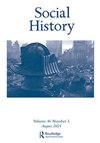所有的爱:萨尔瓦多内战中的跨国青年和残疾
IF 1.1
1区 历史学
Q1 HISTORY
引用次数: 0
摘要
在萨尔瓦多内战期间,法拉本多Martí民族解放阵线(FMLN)发展了基础设施和专业知识,以改善战斗人员和农村及贫困萨尔瓦多人的医疗服务。这个庞大的大众卫生系统包括萨尔瓦多护士、外国医生和社区卫生促进者。然而,数百名受伤战斗人员需要更密集的康复。本文透过三部纪录片探讨马解民族解放运动对待青年与残障人士的方式,检视大众医疗系统、哈瓦那郊外7月26日的康复营,以及德国医师Christa Baatz的工作。这些电影融合了青年、残疾和跨国团结,以呼吁革命的爱的精神。它们不仅谈到跨国团结,而且也是为了建立对马解阵线的支持而分发的跨国案文。最重要的是,他们传达了年轻的残疾战士的声音,否则他们对损失、牺牲和革命的理解就被遗忘了。这些电影表明,在大众医疗系统的互惠原则基础上,人们形成了一种身份认同。然而,1992年《和平协定》的签署确保了人权将成为残疾政治的主要框架,使指导大众健康的团结黯然失色。本文章由计算机程序翻译,如有差异,请以英文原文为准。
All the love: transnational youth and disability in El Salvador’s civil war
ABSTRACT During El Salvador’s civil war, the Farabundo Martí National Liberation Front (FMLN) developed infrastructure and expertise to improve medical attention for combatants and rural and poor Salvadorans alike. This expansive popular health system included Salvadoran nurses, foreign physicians and community health promotors. However, hundreds of wounded combatants required more intensive rehabilitation. This article discusses the FMLN’s approach to youth and disability through a trio of documentary films that examine the popular health system, the 26 July rehabilitation camp outside of Havana and the work of German physician Christa Baatz. These films fused youth, disability and transnational solidarity to appeal to a spirit of revolutionary love. They not only spoke of transnational solidarity but were also transnational texts that circulated in order to build support for the FMLN. Most importantly, they conveyed the voices of young disabled combatants whose understandings of loss, sacrifice and revolution are otherwise forgotten. The films suggest the formation of an identity as lisiados de guerra grounded in the mutualist principles of the popular health system. However, the signing of the Peace Accords in 1992 ensured that human rights would become the dominant framework for disability politics, sidelining the solidarity that guided popular health.
求助全文
通过发布文献求助,成功后即可免费获取论文全文。
去求助
来源期刊

Social History
HISTORY-
CiteScore
1.10
自引率
0.00%
发文量
37
期刊介绍:
For more than thirty years, Social History has published scholarly work of consistently high quality, without restrictions of period or geography. Social History is now minded to develop further the scope of the journal in content and to seek further experiment in terms of format. The editorial object remains unchanged - to enable discussion, to provoke argument, and to create space for criticism and scholarship. In recent years the content of Social History has expanded to include a good deal more European and American work as well as, increasingly, work from and about Africa, South Asia and Latin America.
 求助内容:
求助内容: 应助结果提醒方式:
应助结果提醒方式:


